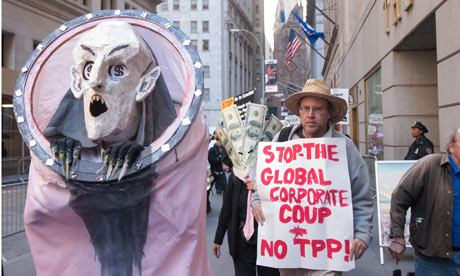Most Americans couldn't tell you what "fast track" means, but if they knew what it entails they would certainly be against it. As one of the country's leading trade law experts and probably the foremost authority on Fast Track, Lori Wallach of Public Citizen's Global Trade Watch, put it:
"[Fast track] authorized executive-branch officials to set US policy on non-tariff, and indeed not-trade, issues in the context of 'trade' negotiations."
This means that fast track, which first began under Nixon in 1974, was not only a usurpation of the US Congress' constitutional authority "to regulate commerce with foreign nations."
It also gave the executive branch -- which is generally much less accountable to public pressure than the Congress -- a means of negating and pre-empting important legislation by our elected representatives. Laws to protect the environment, food safety, consumers (from monopoly pricing), and other public interest concerns can now be traded away in "trade" negotiations. And US law must be made to conform to the treaty.
How ironic that this massive transfer of power to special-interests such as giant pharmaceutical or financial corporations has been sold to the press as a means of holding "special interest" groups -- who might oppose tariff reductions that harm them but are good for everyone else -- in check.
But the TPP and its promoters are full to the brim with ironies. It is quite amazing that a treaty like the TPP can still be promoted as a "free trade" agreement when its most economically important provisions are the exact opposite of "free trade" -- the expansion of protectionism.
Exhibit A was released by WikiLeaks last week: the latest draft of the "intellectual property" chapter of the agreement, one of 24 (out of 29) chapters that do not have to do with trade. This chapter has provisions that will make it easier for pharmaceutical companies to get patents, including in developing countries; have these patents for more years; and extend the ability of these companies to limit access to the scientific data that is necessary for other researchers to develop new medicines. And the United States is even pushing for provisions that would allow surgical procedures to be patented -- provisions that may be currently against US law.
All of these measures will help raise the price of medicines and health care, which will strain public health systems and price some people out of the market for important medicines. It is interesting to see how much worse the TPP is than the WTO's Trips (Trade-Related Aspects of International Property Rights). This, too, was a massive rip-off of consumers and patients throughout the world, but after years of struggle by health advocates and public interest groups, some of its worst features were attenuated, and further consolidation of pharmaceutical companies' interests were blocked.
In case you were wondering why we had to get this information from WikiLeaks, it's because the draft negotiating texts are kept secret from the public. Even members of the US Congress and their staff have extremely limited access. Thus the much-maligned WikiLeaks has once again proven how valuable and justified are their efforts to bring transparency to important policy-making that is done in the darkness -- whether it is "collateral murder," or other forms of life-threatening unaccountability.
One part of the TPP that shows why negotiators want to minimize public awareness of the agreement consists of provisions giving corporations the right -- as is the case under the North American Free Trade Agreement (Nafta) -- to directly sue governments for regulations that infringe upon their profits or potential profits. This, too, is much worse than the WTO, where a corporation has to convince its government to file a case against another government. These private enforcement actions -- which if won collect from the defendant government -- are judged by special tribunals outside of either country's judicial system, without the kinds of due process or openness that exists, for example, in the US legal system. A currently infamous example is the action by Lone Pine Resources, a Delaware-incorporated company, against the government of Quebec for its moratorium on fracking.
Perhaps less known than its other failings, the TPP doesn't even offer any economic gains for the majority of Americans who are being asked to sacrifice their constitutional rights. The gains from increased trade turn out to be so small that they are equivalent to a rounding error in the measurement of our GDP. The study most touted by proponents of the agreement, published by the Peterson Institute of International Economics, shows a cumulative increase of 0.13% of GDP by 2025. This would be trivial in any case; but the worse news is that, taking into account some of the unequalizing effects of the agreement -- these treaties tend to redistribute income upwards -- a Centre for Economic and Policy Research study showed that most Americans will actually lose because of the TPP.
US corporate interests are, rather obviously in this case, driving the agenda of the TPP. The agreement is in many ways a "plan B" after the last 12 years of WTO negotiations have stagnated -- in large part due to considerable, well-organized public resistance in dozens of countries -- and failed to achieve many of the goals of its corporate architects. But other branches of the US government have geostrategic goals as well. The world's would-be rulers also hope to separate the "bad kids" from the "good kids" among developing countries. It is no coincidence that in Latin America, the negotiating partners are Mexico, Chile, and Peru, and none of the leftist governments that now prevail in most of the region. And of course, a main goal of the agreement is to try and "isolate" China.
The Obama administration will no doubt appeal to some members of Congress on the basis of this neocolonial world view. But for Americans who are learning about the agreement, it is clear that the real "us against them" is not America against the more independent nations of the developing world, but TPP countries' citizens against a corporate swindle being negotiated behind their backs.






